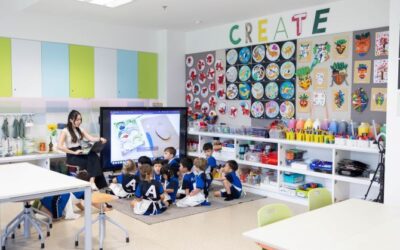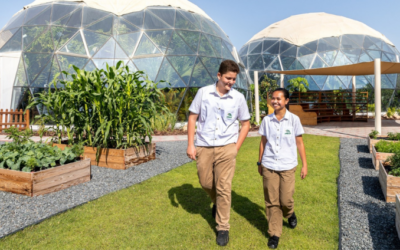Augmented learning
SEK Education Group has several international schools across Europe and the Middle East catering to families and students across the globe. Tell us a bit about your role at SEK Education Group and what you do there?
I specialise in leading business intelligence projects. I work closely with cross-functional teams to define project objectives, scope and deliverables, ensuring they align with SEK’s strategic goals. One aspect that has made this role particularly fascinating is the integration of AI. AI is transforming the field, making it more dynamic and exciting. I’m enthusiastic about the impact we can make on our students with this technology.
How long has SEK Education Group been going and who do you serve?
The SEK Education Group was founded in 1892. We currently manage schools in seven countries – Spain, France, Ireland, Qatar, Saudi Arabia, Bahrain, and Oman – in addition to our recently launched IB Global Online School, which is one of only four schools in the world authorised to offer the IB online. Four of our schools offer boarding options and we accommodate more than 300 international students. In total, SEK schools cater to more than 7,000 students worldwide, from more than 80 nationalities.
Regionally, our four schools in the Gulf are accommodating over 1,500 students from more than 70 nationalities and we’re expecting to grow to more than 3,000 students in the next two years.
How are you using technologies to improve your education offering?
Technology and innovation are vibrant at SEK International Schools. We combine the most up-to-date learning resources and the latest technology in our classrooms, including iPads, robotics and smart boards, using our innovative intelligent classroom methodology to deliver state-of-the-art, student-centred education.
Our first principle is that any student can learn anywhere and at any time. The second is that any student should have access to the tools and content necessary for their learning. The third is that any student should have continuous contact with all their classmates to develop real collaborative work. And finally, every student should have tools on which to reflect on their learning process and the results of it.
The role of technology in this process is key. That’s why we created MySEK – a digital ecosystem with several personalised applications for all members of our educational community. This ecosystem contains tools for video conferencing; collaborative work; educational challenges and projects that can be used by both students and teachers. It gives students immediate access to the physical and digital catalogue of school libraries; personalised access to textbook content; digital notebooks; and even a video platform with recorded classes and support webinars.
We’re also using additional educational technologies to improve analysis, critical thinking, collaboration and self-directed work. Technology facilitates and supports our work, but it also helps us to generate new ideas, to create and develop our educational process.
In what ways are you using technologies such as VR and AI in your learning environments?
We’re in the early stages of integrating AI at an institutional level, recognising its transformative potential for education. For students, we’re exploring AI systems that provide personalised learning experiences, adapting to individual strengths and needs. This could mean customised lesson plans and adaptive feedback on assignments.
For teachers, AI is poised to be an invaluable tool. Not only for offering insights into student performance, but also saving significant time on administrative tasks. This will allow teachers to focus more on creative and student-support activities, enhancing the overall student experience. While we’re just beginning to scratch the surface of AI’s potential in education, our goal is to harness its power to create a more engaging, inclusive, and personalised educational experience for all.
At the moment, we’re strategically integrating AI into our educational framework, emphasising its ethical and effective use. For teachers, AI is enhancing content creation for lesson plans. By harnessing AI’s capabilities, we are able to develop more dynamic and diverse educational materials, allowing for a richer learning experience. This includes using AI to analyse vast amounts of educational content to suggest creative approaches and up-to-date information that can be incorporated into lessons.
On the student side, we’re shifting the competencies developed in our activities to encourage the use of AI. This involves designing projects and assignments where students actively engage with AI tools, fostering skills like critical thinking, problem solving and digital literacy. By doing so, we’re not just teaching students about AI theoretically, but we’re also empowering them to use AI as a tool for their own learning and creativity. This approach is part of our broader goal to prepare students for a future where AI is an integral part of many professional and academic fields.
As for VR [virtual reality], we have experimented with it before for specific applications, providing immersive learning experiences in certain contexts. Our focus, however, with these technologies is always on how they can meaningfully contribute to a student’s learning while aligning with our ethical standards.
Many schools are now integrating AI. I expect there will be some learning curves. How are you ensuring ethical integration of new technologies across your schools and universities?
At SEK Education Group, our core commitment is to a student-centered approach in integrating new technologies. Every decision we make is guided by the principle that it must benefit and in no way harm our students. We achieve this through a robust framework that includes clear ethical guidelines, active stakeholder involvement, stringent data protection measures and continuous policy reviews. Ensuring that technology enhances educational outcomes without compromising our students’ wellbeing is at the heart of everything we do and I think is an important factor for any school integrating its use.
Taking a long view, what do you imagine classrooms and learning environments will look like in the next decade or so?
Looking ahead, I envision classrooms as highly interactive and technologically integrated spaces. We expect to see immersive tools like VR and AR [augmented reality] along with AI-driven personalised learning becoming more commonplace. But as we embrace these advancements, the challenge of the technology access gap becomes more pronounced. It’s imperative that we work collectively – educators, policymakers and technology leaders – to ensure equitable access to these resources. This means not only providing the necessary tools, but also ensuring that teachers are well-equipped and trained to use them effectively.
Our goal should be to make these transformative educational experiences universally accessible, thereby democratising education for all and enabling all students, regardless of their background and location, to benefit from these technological advancements. This approach is key to preparing a diverse student population for a rapidly evolving world of work and an increasingly global landscape.
Lastly, what’s unique about SEK’s schools and what would you say to a prospective parent or student looking to attend one?
We are a family-owned business and I think this really trickles down to the everyday life of students. We all feel part of a family. Family culture and family values are really present in every one of our schools. If you attend our schools, you know that the head and all the teachers will know you individually. We also run an international curriculum – British, American or IB – based on three pillars: innovation, sports, and the arts. We’re very proud of our rich multicultural, multilingual international community and our long history in education.
In numbers
+100,000 The number of SEK alumni
1977 SEK becomes the first school to introduce the IB curriculum to Spain
Augmente35 SEK schools feature in the top 35 IB schools in the world
1892 SEK’s first school opens in Madrid, Spain
2021 SEK’s first school opens in Riyadh, Saudi Arabia





